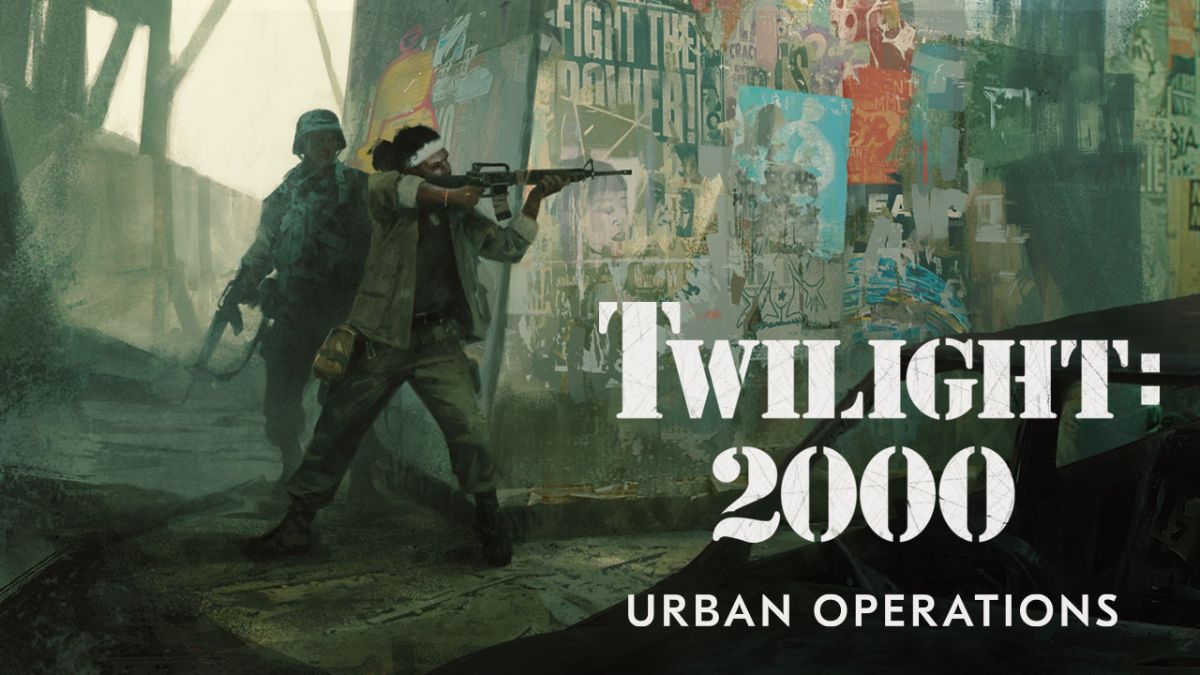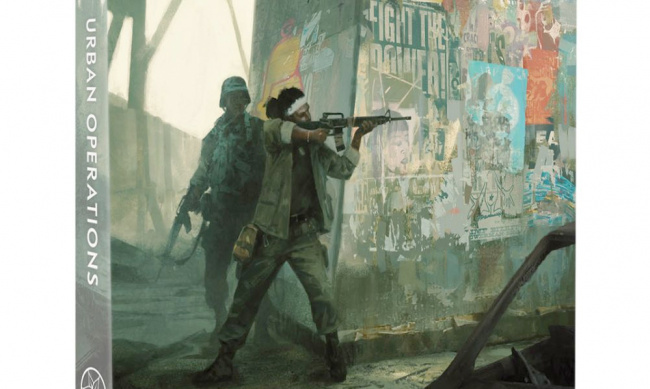Imagine surviving another battle in war only to find yourself cut off from command. No medevac, no calling in incoming fire, no reinforcements, no going home. Twilight: 2000 takes the Year Zero system and couples it with brutal combat that leaves it mark on everyone involved who survives. A campaign kicks off with a lost battle and the last communication from headquarters, “Good luck. You’re on your own now.”
 Twilight: 2000 is a boxed set stuffed to the top with two rulebooks, combat maps, poster maps of Poland and Sweden, cardboard tokens, cards, and dice. Everything needed to get started is included. My thanks to Free League for providing me a copy to review.
Twilight: 2000 is a boxed set stuffed to the top with two rulebooks, combat maps, poster maps of Poland and Sweden, cardboard tokens, cards, and dice. Everything needed to get started is included. My thanks to Free League for providing me a copy to review.
The system is a variation of the Year Zero Engine. Instead of a dice pool, rolls are made with one attribute die and one skill die that range from a d6 up to a d12. Player characters track radiation points and use coolness under fire (CUF) to remain calm in combat. It even includes hit locations. The Referee Manual has rules to convert 1st and 2nd edition material as well as solo rules.
The PCs are going to endure hardship, experience fear, and feel like they are up against all odds. Some PCs are going to die. What is going to make the campaign work are those fleeting moments of victory and especially those times the PCs really get to make a difference. These wins may be helping people in need, creating a safe haven, and maybe someday even returning home. These emotional wins function as a means of catharsis from fear and anger, and not only will the character feel good but so will the players themselves.
To pull of this range of emotions, the rules have to simulate the stress of combat and the toll it takes to be good at killing people. Coolness under fire (CUF) is a mechanic that allows PCs to function while getting shot at and to bring the violence to the enemy. However, as CUF rises and their skill at killing increases, their Empathy goes down as they find it hard to interact in normal ways. This drop in Empathy also ties in to killing a helpless foe as actually committing this act first requires a failed Empathy roll or a PC can’t go through with it. So a PC with a higher CUF also has an easier time killing outside of combat.
This combination is powerful. In order for the emotional toll to be worth it, the PCs need to get some real wins. This is where the referee comes in. A referee needs a way to be impartial. To allow random events to happen and not come across as the bringer of misery.

At the same time, the referee also has to set up those moments of difficult choices for the PCs. Present PCs with tough situations with no easy solution and let them figure things out for themselves.
The rules support the referee both by providing dozens of small encounters that can happen completely randomly alongside a handful of full adventures with tough choices. In one adventure, the PCs have to face child soldiers. What happens if they have to fight them? In another, siding with marauders against the locals may help the PCs out more than defending the locals. Are they willing to side with the bad guys to get ahead? And there is enough overall background on and rule support for the various powers in Poland and Sweden for the referee to make their own adventures.
The best part is, a referee can simply pull out the map of Poland and Sweden, point to the hex the PCs are in, and repeat the last message from HQ: “Good luck. You’re on your own now.” Where the PCs go and what they do next is entirely up to them. And the campaign kicks off from there.
Free League has never disappointed me with an RPG before. But this one really resonates with me and the value is outstanding. Months and months of gaming can be found in this one box. And it will be a Twilight: 2000 campaign of hardship, hard choices, death, and every once in a while, hope.
The system is a variation of the Year Zero Engine. Instead of a dice pool, rolls are made with one attribute die and one skill die that range from a d6 up to a d12. Player characters track radiation points and use coolness under fire (CUF) to remain calm in combat. It even includes hit locations. The Referee Manual has rules to convert 1st and 2nd edition material as well as solo rules.
The PCs are going to endure hardship, experience fear, and feel like they are up against all odds. Some PCs are going to die. What is going to make the campaign work are those fleeting moments of victory and especially those times the PCs really get to make a difference. These wins may be helping people in need, creating a safe haven, and maybe someday even returning home. These emotional wins function as a means of catharsis from fear and anger, and not only will the character feel good but so will the players themselves.
To pull of this range of emotions, the rules have to simulate the stress of combat and the toll it takes to be good at killing people. Coolness under fire (CUF) is a mechanic that allows PCs to function while getting shot at and to bring the violence to the enemy. However, as CUF rises and their skill at killing increases, their Empathy goes down as they find it hard to interact in normal ways. This drop in Empathy also ties in to killing a helpless foe as actually committing this act first requires a failed Empathy roll or a PC can’t go through with it. So a PC with a higher CUF also has an easier time killing outside of combat.
This combination is powerful. In order for the emotional toll to be worth it, the PCs need to get some real wins. This is where the referee comes in. A referee needs a way to be impartial. To allow random events to happen and not come across as the bringer of misery.
At the same time, the referee also has to set up those moments of difficult choices for the PCs. Present PCs with tough situations with no easy solution and let them figure things out for themselves.
The rules support the referee both by providing dozens of small encounters that can happen completely randomly alongside a handful of full adventures with tough choices. In one adventure, the PCs have to face child soldiers. What happens if they have to fight them? In another, siding with marauders against the locals may help the PCs out more than defending the locals. Are they willing to side with the bad guys to get ahead? And there is enough overall background on and rule support for the various powers in Poland and Sweden for the referee to make their own adventures.
The best part is, a referee can simply pull out the map of Poland and Sweden, point to the hex the PCs are in, and repeat the last message from HQ: “Good luck. You’re on your own now.” Where the PCs go and what they do next is entirely up to them. And the campaign kicks off from there.
Free League has never disappointed me with an RPG before. But this one really resonates with me and the value is outstanding. Months and months of gaming can be found in this one box. And it will be a Twilight: 2000 campaign of hardship, hard choices, death, and every once in a while, hope.



